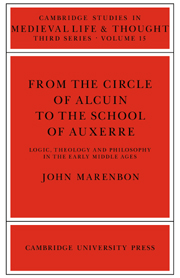 From the Circle of Alcuin to the School of Auxerre
From the Circle of Alcuin to the School of Auxerre Book contents
- Frontmatter
- Contents
- Acknowledgements
- Introduction
- 1 Aristotle's Categories and the problems of essence and the Universals: sources for early medieval philosophy
- 2 Logic and theology at the court of Charlemagne
- 3 Problems of the Categories, essence and the Universals in the work of John Scottus and Ratramnus of Corbie
- 4 The circle of John Scottus Eriugena
- 5 Early medieval glosses on the problems of the Categories
- Conclusion
- APPENDIX 1 Texts from the circle of Alcuin
- APPENDIX 2 A Periphyseon florilegium
- APPENDIX 3 Glosses to the Categoriae Decem
- Bibliography (including index of manuscripts and list of abbreviations)
- Index
Conclusion
Published online by Cambridge University Press: 24 October 2009
- Frontmatter
- Contents
- Acknowledgements
- Introduction
- 1 Aristotle's Categories and the problems of essence and the Universals: sources for early medieval philosophy
- 2 Logic and theology at the court of Charlemagne
- 3 Problems of the Categories, essence and the Universals in the work of John Scottus and Ratramnus of Corbie
- 4 The circle of John Scottus Eriugena
- 5 Early medieval glosses on the problems of the Categories
- Conclusion
- APPENDIX 1 Texts from the circle of Alcuin
- APPENDIX 2 A Periphyseon florilegium
- APPENDIX 3 Glosses to the Categoriae Decem
- Bibliography (including index of manuscripts and list of abbreviations)
- Index
Summary
Many a reader will doubtless dissent from some of the arguments I have advanced, and disagree with some of the interpretations I have given. But no one, I hope, who has read these pages will think that the early medieval period was the philosophical desert, watered by the fewest oases, which some historians have portrayed. At the courts of Charlemagne and Charles the Bald, and in the monasteries of Corbie and Auxerre, men of the early Middle Ages made their first attempts to grapple with abstract problems by the exercise of reason. I have presented evidence to suggest that philosophy is a term which can properly be used of some part of these thinkers’ activity. The imposition of theological interests on logical texts led them to ask questions about the fundamental constitution of reality, and to give answers which were consistent with Christian dogma but not in any simple way derived from it.
The period of philosophy I have studied is thus one of beginnings. It is characterized not by the perfected clarity of its arguments, nor by the coherence of its systems, but rather by a tentativeness in reasoning that can approach dullness, or alternatively, by a premature brilliance which often conceals deep intellectual confusion. Moreover, much of the substance of early medieval philosophy lay in a tradition of teaching, learning and discussion in schools and monasteries: the evidence for this tradition is various in kind, and requires extensive analysis before it may be fully interpreted.
- Type
- Chapter
- Information
- From the Circle of Alcuin to the School of AuxerreLogic, Theology and Philosophy in the Early Middle Ages, pp. 139 - 143Publisher: Cambridge University PressPrint publication year: 1981
